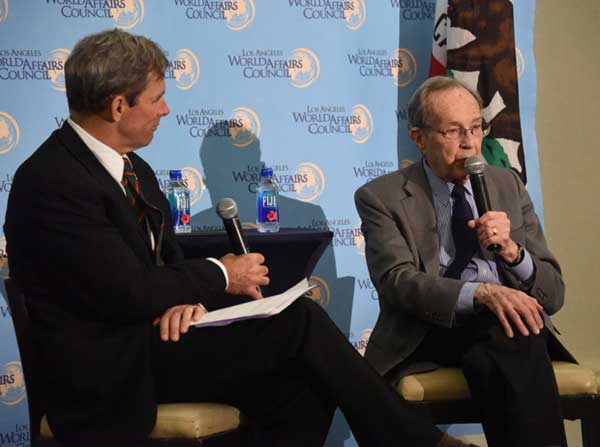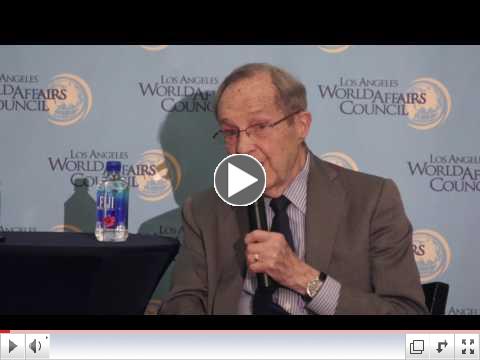
William Perry, Former U.S. Secretary of Defense (right)
The threat of nuclear war is greater today than it was even at the height of the Cold War, according to Dr. William Perry, Former Secretary of Defense. At a LAWAC dinner on Thursday, February 23rd, Perry said that most people assumed that once the Cold War ended, so too did the threat of nuclear weapons being used – whereas he believes the opposite to be the case. Drawing on his long career in nuclear defense starting during the Cuban Missile Crisis, he outlined current threats from ISIS acquiring a stolen weapon to an India-Pakistan nuclear exchange to what he said would be the most serious, a Russian attack that “could end the world”.
Perry cited the Cuban Missile Crisis as an example of how nuclear war could easily have broken out, because of incomplete information on the part of one of the sides. Perry was asked to come to Washington in 1962 to help analyze US intelligence photographs during the Crisis, as the Joint Chiefs were unanimously advising President Kennedy to invade Cuba to stop the Soviets installing nuclear missiles that could reach the US mainland. “I would go back to my hotel room each night thinking this would be my last day on earth,” he said. Fortunately Kennedy decided against an invasion – and it was only much later that the US learned that the Soviets had already installed short range nuclear missiles on Cuba that would have been used against any attacking US force, which would in turn have sparked a full-scale strategic nuclear exchange.
It was not the only time we came close to a nuclear war: Perry referred to a number of false alarms that occurred on both sides during the Cold War. “It was a miracle that a nuclear war was not started by mistake”.
Moving on to current nuclear threats, Perry said that the most serious threat to the planet still comes from Russia, which has recently been upgrading its nuclear arsenal. President Putin knows that his conventional forces have fallen far behind the US, and so he is increasing his nuclear weapons to compensate. The US has taken note of this and is promising to follow suit – leading us back towards another Cold War-style nuclear arms race. Perry said he still sees a nuclear attack from Russia as unlikely, but pointed out it is the only attack that would “result in a nuclear war that would end the world”.
Another nuclear threat Perry discussed was the potential of an India-Pakistan “regional” nuclear war. Even if the two sides just fired 100 nuclear missiles or so, tens of millions of Indians and Pakistanis would die on the subcontinent, and an enormous amount of dust would be deposited in the atmosphere which would shroud the entire planet, reducing global temperatures by four or five degrees for years. This would cause global famine and “widespread socioeconomic consequences for the entire planet”.
Perry said that his real fear is of a terrorist organization, such as ISIS, getting their hands on nuclear weapons. Even though he thinks it’s unlikely that ISIS will obtain a nuclear weapon, Perry says that if ISIS were to lay their hands on one, they would be the most likely to actually use it, as they would not be interested in negotiating and would “without a doubt obliterate entire American cities. Chances are low, but they would be catastrophic.”
North Korea, the only country to have actually carried out a nuclear test in the 21st century, and which now has some 20 nuclear weapons, doesn’t scare Perry as much. “They’re not suicidal,” he said. Their main priority is to continue the Kim dynasty, and they know that a nuclear attack would bring certain retaliation. Perry has made a number of trips to North Korea, and is under no illusions about the nature of the regime. “North Korea is probably the worst government in the world, and that’s saying something,” said Perry. His concern with a nuclear North Korea is that they are prone to provocative action, which could lead to a very destructive war on the Korean peninsula.
Perry said he supported the recent Iran Nuclear Deal, even if it is not perfect. The alternative, he said, would be a complete lack of control over Iran’s nuclear program. “Some would propose that we should renegotiate a better Iran Deal and to that I would flatly say ‘that is a fantasy’.” The initial deal was forced through because of the economic sanctions that all the major powers imposed on Iran. Perry said that if the U.S. were to pull out of the deal, we would also “lose the Chinese, the Russians and the Europeans.” With no leverage from sanctions, the Iranians would have no incentive to come back to the table to renegotiate a new deal.
On how we reduce the threat of nuclear war, Perry said the first thing was to make the public understand that the nuclear threat still exists, and is in fact getting greater, contrary to what most people believe. He said we need to lower the danger of accidentally starting a nuclear war by abandoning the “Launch on Warning” rule, under which the President has just five or so minutes to decide on launching missiles if it is thought the US is under attack. The reason for this is that any first wave attack is likely to be partly aimed at all our land-based missile sites, which could be disabled by an incoming first strike. Perry said we should transition from relying on land-based intercontinental ballistic missiles to nuclear submarines, a move that would make us safer from potential attacks because the subs are very difficult for the enemy to locate, therefore giving us more time to evaluate if a warning is real, and then to respond. But in the long-term Perry said we need to decrease tension with Russia by solving issues that we agree on first and then focusing on what we disagree on.
When asked about whether President Trump was a safe overseer of US nuclear security, Perry said that he hoped “whoever is President” when a nuclear alert is announced is “calm, level-headed and of good temperament” – a statement that drew both laughs and gasps from the audience.

 William Perry on Nuclear Threats and Russia
William Perry on Nuclear Threats and Russia